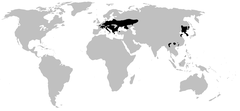|
Kumakowate
Kumakowate
| Bombinatoridae[1]
|
| J.E. Gray, 1825[2]
|
|
|

Przedstawiciel rodziny – kumak górski (Bombina variegata)
|
| Systematyka
|
| Domena
|
eukarionty
|
| Królestwo
|
zwierzęta
|
| Typ
|
strunowce
|
| Podtyp
|
kręgowce
|
| Gromada
|
płazy
|
| Rząd
|
płazy bezogonowe
|
| Podrząd
|
Archaeobatrachia
|
| Rodzina
|
kumakowate
|
| Typ nomenklatoryczny
|
|
Bombinator Merrem, 1820 (= Bombina Oken, 1816)
|
| Synonimy
|
- Bombinatorina J.E. Gray, 1825[2]
- Bombinatoroidea — Fitzinger, 1826[3]
- Bombinatoridae — J.E. Gray, 1825[4]
- Bombinatores — von Tschudi, 1838[5]
- Bombitatores Fitzinger, 1843[6][a]
- Bombinatorida — Bayer, 1885[7]
- Bombininae Fejérváry, 1922[8][b]
- Bombinidae — Tamarunov, 1964[9]
- Bombinatorinae — Dubois, 1983[10]
- Bombinatoridae — Ford & Cannatella, 1993[11]
- Bombinatoroidia — Dubois, 2005[12]
- Bombinatoroidea — Dubois, 2005[12]
|
|
| Rodzaje
|
|
|
| Zasięg występowania
|

|
|
|
|
|
Kumakowate (Bombinatoridae) – rodzina płazów z grupy Archaeobatrachia w rzędzie płazów bezogonowych (Anura).
Zasięg występowania
Rodzina obejmuje gatunki występujące we Francji i we Włoszech na wschód do wschodniej Rosji i Turcji, Chin, Korei i Wietnamu oraz na Borneo (środkowy Kalimantan, Indonezja) i Filipinach[13].
Podział systematyczny
Do rodzaju należą następujące rodzaje[13]:
Uwagi
- ↑ Rodzaj typowy: Bombitator Wagler, 1830 (= Bombinator Merrem, 1820).
- ↑ Rodzaj typowy: Bombina Oken, 1816.
Przypisy
- ↑ Bombinatoridae, [w:] Integrated Taxonomic Information System (ang.).
- ↑ a b J.E. Gray. A Synopsis of the genera of Reptiles and Amphibia, with a description of some new species. „Annals of Philosophy”. New Series. 10, s. 214, 1825. (ang.).
- ↑ L.J.F.J. Fitzinger: Neue classification der reptilien nach ihren natürlichen verwandtschaften: nebst einer verwandtschafts-tafel und einem verzeichnisse der reptilien-sammlung des K. K. zoologischen museum’s zu Wien. Wien: J. G. Heubner, 1826, s. 63. (niem.).
- ↑ J.E. Gray: Description of two new genera of frogs discovered by John Reeves, Esq. in China. W: J.E. Gray: The zoological miscellany: to be continued occasionally. London: Treuttel, Wurtz and Co., G.B. Sowerby, W. Wood, 1831–1844, s. 26. (ang.).
- ↑ J.J. von Tschudi: Classification der Batrachier mit Berücksichtigung der fossilen Thiere dieser Abtheilung der Reptilien. Neuchâtel: Petitpierre, 1838, s. 94. (niem.).
- ↑ L.J.F.J. Fitzinger: Systema reptilium. Fasciculus primus, Amblyglossae. Vindobonae: Braumüller et Seidel, 1843, s. 32. (łac.).
- ↑ F. Bayer. O kostre zab z celedi pelobatid. „Abhandlungen der Königlichen Böhmischen Gesellschaft der Wissenschaften”. 12, s. 18, 1884. (cz.).
- ↑ G.G. Fejérváry. Kritische Bemerkungen zur Osteologie, Phylogenie und Systematik der Anuren. „Archiv für Naturgeschichte”. Abteilung A. 22 (3), s. 25, 1922. (niem.).
- ↑ L.P. Tamarunov: Salientia. W: Y.A. Orlov (red.): Osnovy Paleontologii: spravochnik dlia paleontologov i geologov SSSR. Cz. 12: Amphibia-Aves. Moskwa: Nauka, 1964, s. 126. (ros.).
- ↑ A. Dubois. Classification et nomenclature supragenerique des amphibiens anoures. „Bulletin Mensuel de la Société Linnéenne de Lyon”. 52 (9), s. 271, 1983. (fr.).
- ↑ L.S. Ford & D.C. Cannatella. The major clades of frogs. „Herpetological Monographs”. 7, s. 94–117, 1993. (ang.).
- ↑ a b A. Dubois. Amphibia Mundi. 1.1. An ergotaxonomy of Recent amphibians. „Alytes”. 23 (1), s. 7, 2005. (ang.).
- ↑ a b D. Frost: Bombinatoridae Gray, 1825. [w:] Amphibian Species of the World 6.0, an Online Reference [on-line]. American Museum of Natural History. [dostęp 2019-12-06]. (ang.).
Identyfikatory zewnętrzne:
|
|